Travel and Tourism Sector Analysis - BTEC HND Module Unit 1 Report
VerifiedAdded on 2020/02/03
|13
|3784
|45
Report
AI Summary
This report provides a comprehensive overview of the travel and tourism sector, exploring its historical development, structure, and the influence of various factors. It examines the implications of political changes, factors affecting tourism demand, and the strategies employed by companies like TUI Group to meet this demand. The report also analyzes the economic, environmental, and social impacts of tourism, along with strategies to mitigate negative effects and maximize positive outcomes. The content covers various aspects of the sector, from its evolution to its current state, including the role of government, private sector involvement, and the importance of customer satisfaction. It also highlights the significance of the travel and tourism sector for the UK's economy and its potential for future growth. The report includes an analysis of the challenges and opportunities within the industry, providing insights into how businesses can adapt and thrive in a dynamic environment.
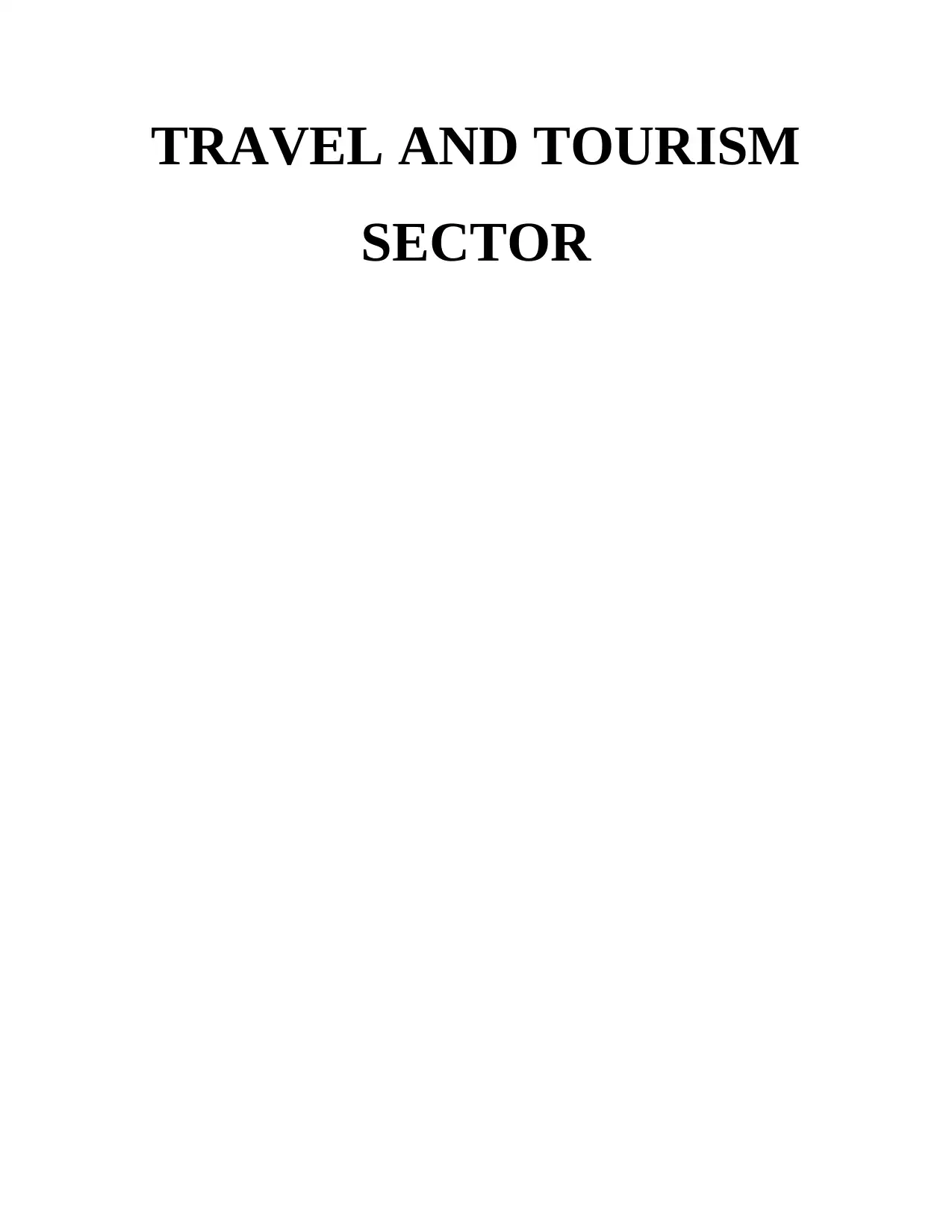
TRAVEL AND TOURISM
SECTOR
SECTOR
Paraphrase This Document
Need a fresh take? Get an instant paraphrase of this document with our AI Paraphraser
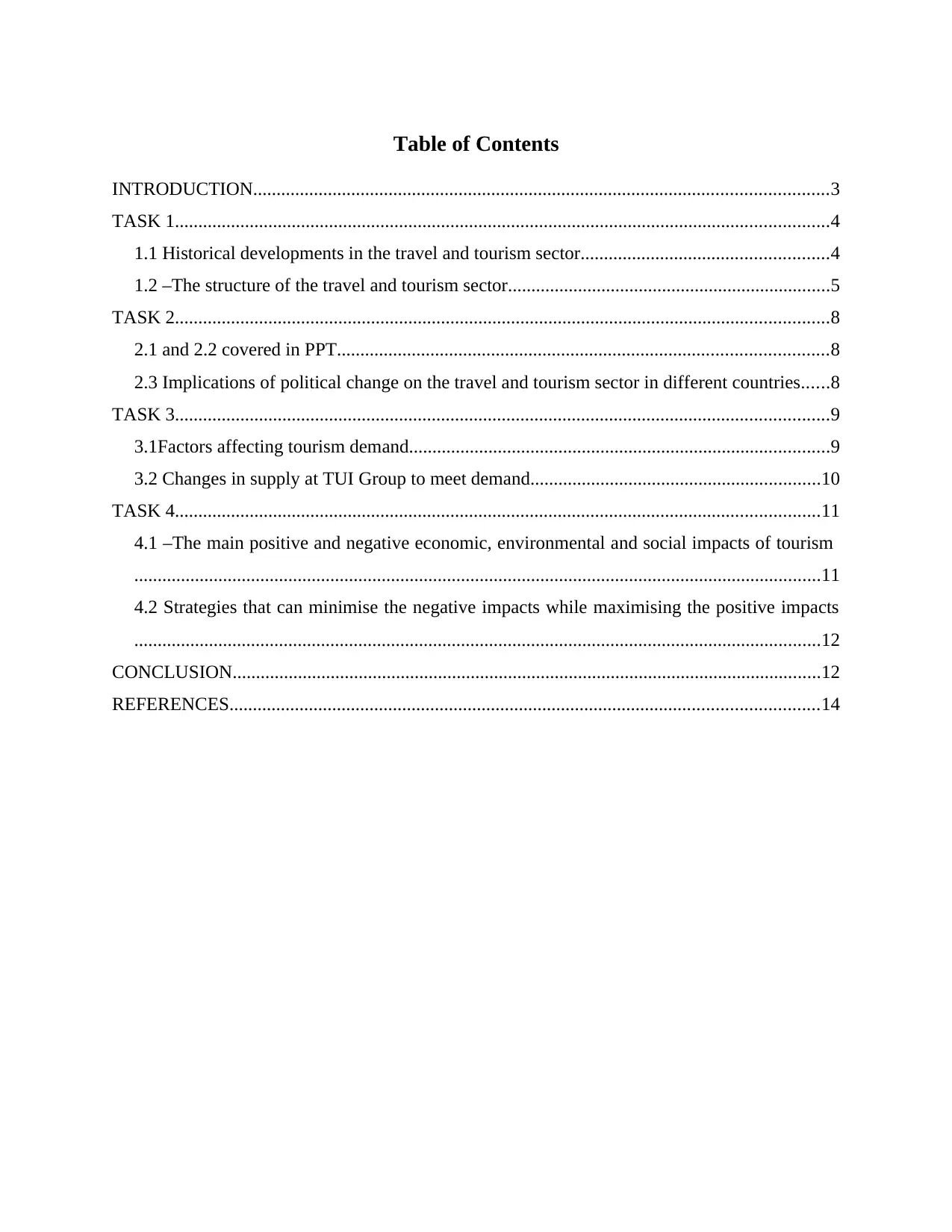
Table of Contents
INTRODUCTION...........................................................................................................................3
TASK 1............................................................................................................................................4
1.1 Historical developments in the travel and tourism sector.....................................................4
1.2 –The structure of the travel and tourism sector.....................................................................5
TASK 2............................................................................................................................................8
2.1 and 2.2 covered in PPT.........................................................................................................8
2.3 Implications of political change on the travel and tourism sector in different countries......8
TASK 3............................................................................................................................................9
3.1Factors affecting tourism demand..........................................................................................9
3.2 Changes in supply at TUI Group to meet demand..............................................................10
TASK 4..........................................................................................................................................11
4.1 –The main positive and negative economic, environmental and social impacts of tourism
...................................................................................................................................................11
4.2 Strategies that can minimise the negative impacts while maximising the positive impacts
...................................................................................................................................................12
CONCLUSION..............................................................................................................................12
REFERENCES..............................................................................................................................14
INTRODUCTION...........................................................................................................................3
TASK 1............................................................................................................................................4
1.1 Historical developments in the travel and tourism sector.....................................................4
1.2 –The structure of the travel and tourism sector.....................................................................5
TASK 2............................................................................................................................................8
2.1 and 2.2 covered in PPT.........................................................................................................8
2.3 Implications of political change on the travel and tourism sector in different countries......8
TASK 3............................................................................................................................................9
3.1Factors affecting tourism demand..........................................................................................9
3.2 Changes in supply at TUI Group to meet demand..............................................................10
TASK 4..........................................................................................................................................11
4.1 –The main positive and negative economic, environmental and social impacts of tourism
...................................................................................................................................................11
4.2 Strategies that can minimise the negative impacts while maximising the positive impacts
...................................................................................................................................................12
CONCLUSION..............................................................................................................................12
REFERENCES..............................................................................................................................14
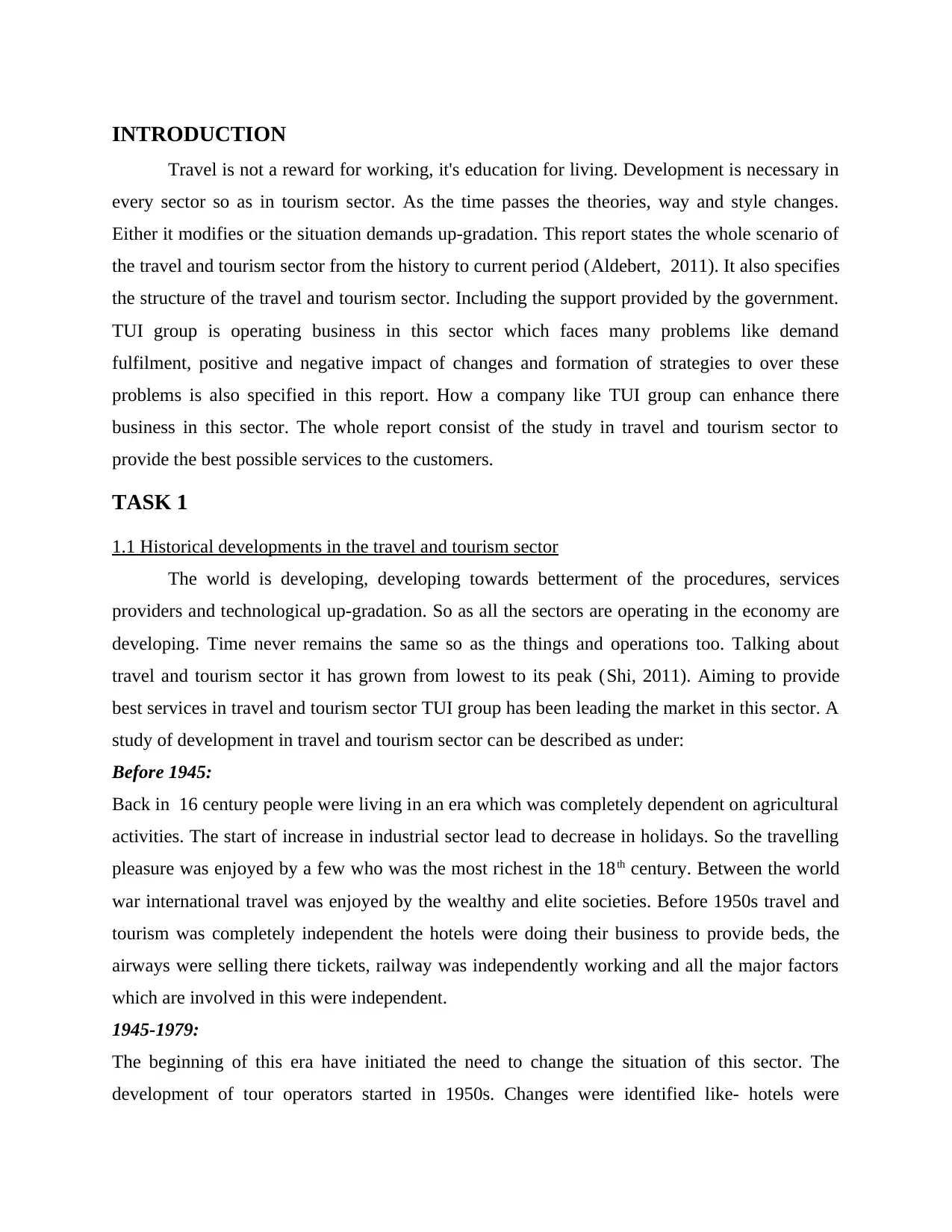
INTRODUCTION
Travel is not a reward for working, it's education for living. Development is necessary in
every sector so as in tourism sector. As the time passes the theories, way and style changes.
Either it modifies or the situation demands up-gradation. This report states the whole scenario of
the travel and tourism sector from the history to current period (Aldebert, 2011). It also specifies
the structure of the travel and tourism sector. Including the support provided by the government.
TUI group is operating business in this sector which faces many problems like demand
fulfilment, positive and negative impact of changes and formation of strategies to over these
problems is also specified in this report. How a company like TUI group can enhance there
business in this sector. The whole report consist of the study in travel and tourism sector to
provide the best possible services to the customers.
TASK 1
1.1 Historical developments in the travel and tourism sector
The world is developing, developing towards betterment of the procedures, services
providers and technological up-gradation. So as all the sectors are operating in the economy are
developing. Time never remains the same so as the things and operations too. Talking about
travel and tourism sector it has grown from lowest to its peak (Shi, 2011). Aiming to provide
best services in travel and tourism sector TUI group has been leading the market in this sector. A
study of development in travel and tourism sector can be described as under:
Before 1945:
Back in 16 century people were living in an era which was completely dependent on agricultural
activities. The start of increase in industrial sector lead to decrease in holidays. So the travelling
pleasure was enjoyed by a few who was the most richest in the 18th century. Between the world
war international travel was enjoyed by the wealthy and elite societies. Before 1950s travel and
tourism was completely independent the hotels were doing their business to provide beds, the
airways were selling there tickets, railway was independently working and all the major factors
which are involved in this were independent.
1945-1979:
The beginning of this era have initiated the need to change the situation of this sector. The
development of tour operators started in 1950s. Changes were identified like- hotels were
Travel is not a reward for working, it's education for living. Development is necessary in
every sector so as in tourism sector. As the time passes the theories, way and style changes.
Either it modifies or the situation demands up-gradation. This report states the whole scenario of
the travel and tourism sector from the history to current period (Aldebert, 2011). It also specifies
the structure of the travel and tourism sector. Including the support provided by the government.
TUI group is operating business in this sector which faces many problems like demand
fulfilment, positive and negative impact of changes and formation of strategies to over these
problems is also specified in this report. How a company like TUI group can enhance there
business in this sector. The whole report consist of the study in travel and tourism sector to
provide the best possible services to the customers.
TASK 1
1.1 Historical developments in the travel and tourism sector
The world is developing, developing towards betterment of the procedures, services
providers and technological up-gradation. So as all the sectors are operating in the economy are
developing. Time never remains the same so as the things and operations too. Talking about
travel and tourism sector it has grown from lowest to its peak (Shi, 2011). Aiming to provide
best services in travel and tourism sector TUI group has been leading the market in this sector. A
study of development in travel and tourism sector can be described as under:
Before 1945:
Back in 16 century people were living in an era which was completely dependent on agricultural
activities. The start of increase in industrial sector lead to decrease in holidays. So the travelling
pleasure was enjoyed by a few who was the most richest in the 18th century. Between the world
war international travel was enjoyed by the wealthy and elite societies. Before 1950s travel and
tourism was completely independent the hotels were doing their business to provide beds, the
airways were selling there tickets, railway was independently working and all the major factors
which are involved in this were independent.
1945-1979:
The beginning of this era have initiated the need to change the situation of this sector. The
development of tour operators started in 1950s. Changes were identified like- hotels were
⊘ This is a preview!⊘
Do you want full access?
Subscribe today to unlock all pages.

Trusted by 1+ million students worldwide
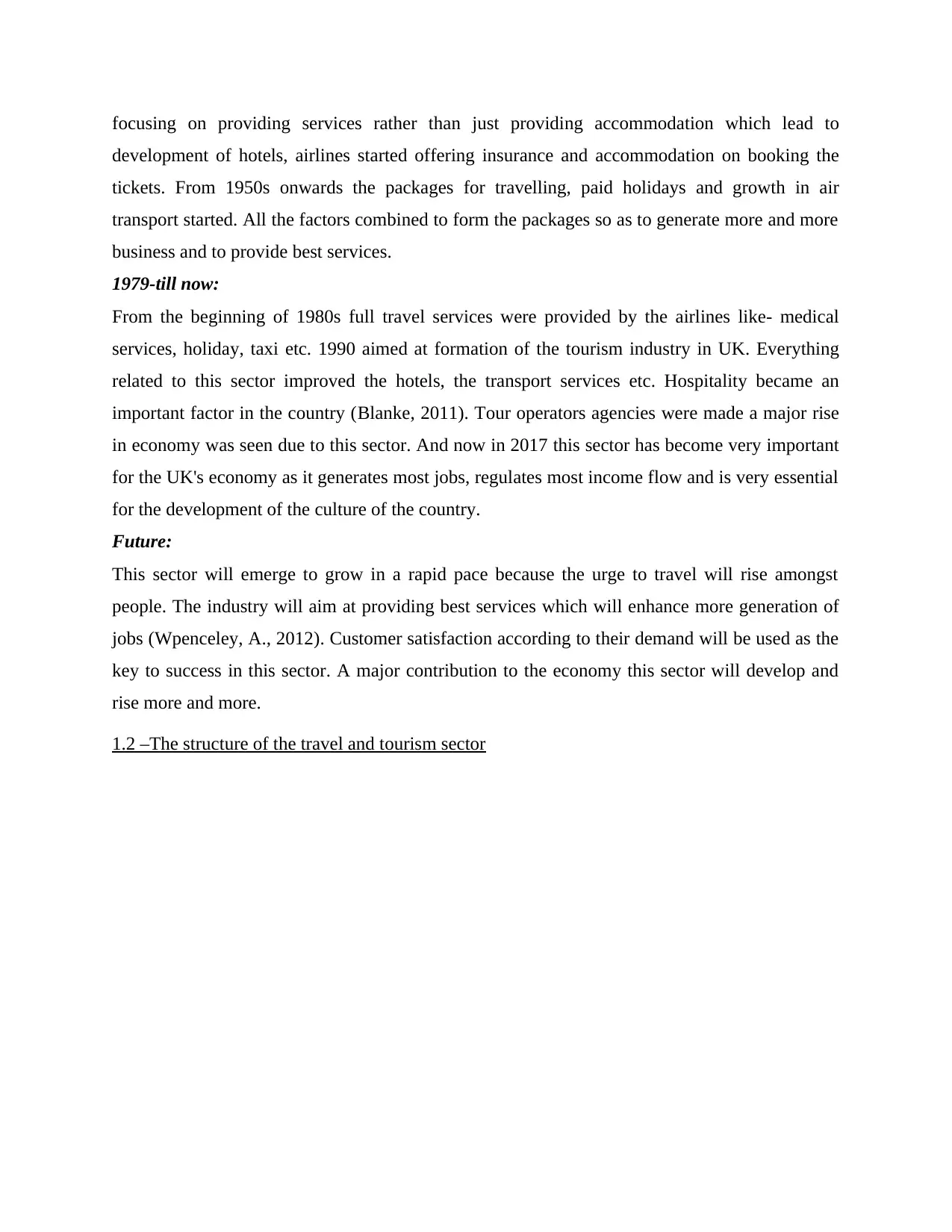
focusing on providing services rather than just providing accommodation which lead to
development of hotels, airlines started offering insurance and accommodation on booking the
tickets. From 1950s onwards the packages for travelling, paid holidays and growth in air
transport started. All the factors combined to form the packages so as to generate more and more
business and to provide best services.
1979-till now:
From the beginning of 1980s full travel services were provided by the airlines like- medical
services, holiday, taxi etc. 1990 aimed at formation of the tourism industry in UK. Everything
related to this sector improved the hotels, the transport services etc. Hospitality became an
important factor in the country (Blanke, 2011). Tour operators agencies were made a major rise
in economy was seen due to this sector. And now in 2017 this sector has become very important
for the UK's economy as it generates most jobs, regulates most income flow and is very essential
for the development of the culture of the country.
Future:
This sector will emerge to grow in a rapid pace because the urge to travel will rise amongst
people. The industry will aim at providing best services which will enhance more generation of
jobs (Wpenceley, A., 2012). Customer satisfaction according to their demand will be used as the
key to success in this sector. A major contribution to the economy this sector will develop and
rise more and more.
1.2 –The structure of the travel and tourism sector
development of hotels, airlines started offering insurance and accommodation on booking the
tickets. From 1950s onwards the packages for travelling, paid holidays and growth in air
transport started. All the factors combined to form the packages so as to generate more and more
business and to provide best services.
1979-till now:
From the beginning of 1980s full travel services were provided by the airlines like- medical
services, holiday, taxi etc. 1990 aimed at formation of the tourism industry in UK. Everything
related to this sector improved the hotels, the transport services etc. Hospitality became an
important factor in the country (Blanke, 2011). Tour operators agencies were made a major rise
in economy was seen due to this sector. And now in 2017 this sector has become very important
for the UK's economy as it generates most jobs, regulates most income flow and is very essential
for the development of the culture of the country.
Future:
This sector will emerge to grow in a rapid pace because the urge to travel will rise amongst
people. The industry will aim at providing best services which will enhance more generation of
jobs (Wpenceley, A., 2012). Customer satisfaction according to their demand will be used as the
key to success in this sector. A major contribution to the economy this sector will develop and
rise more and more.
1.2 –The structure of the travel and tourism sector
Paraphrase This Document
Need a fresh take? Get an instant paraphrase of this document with our AI Paraphraser
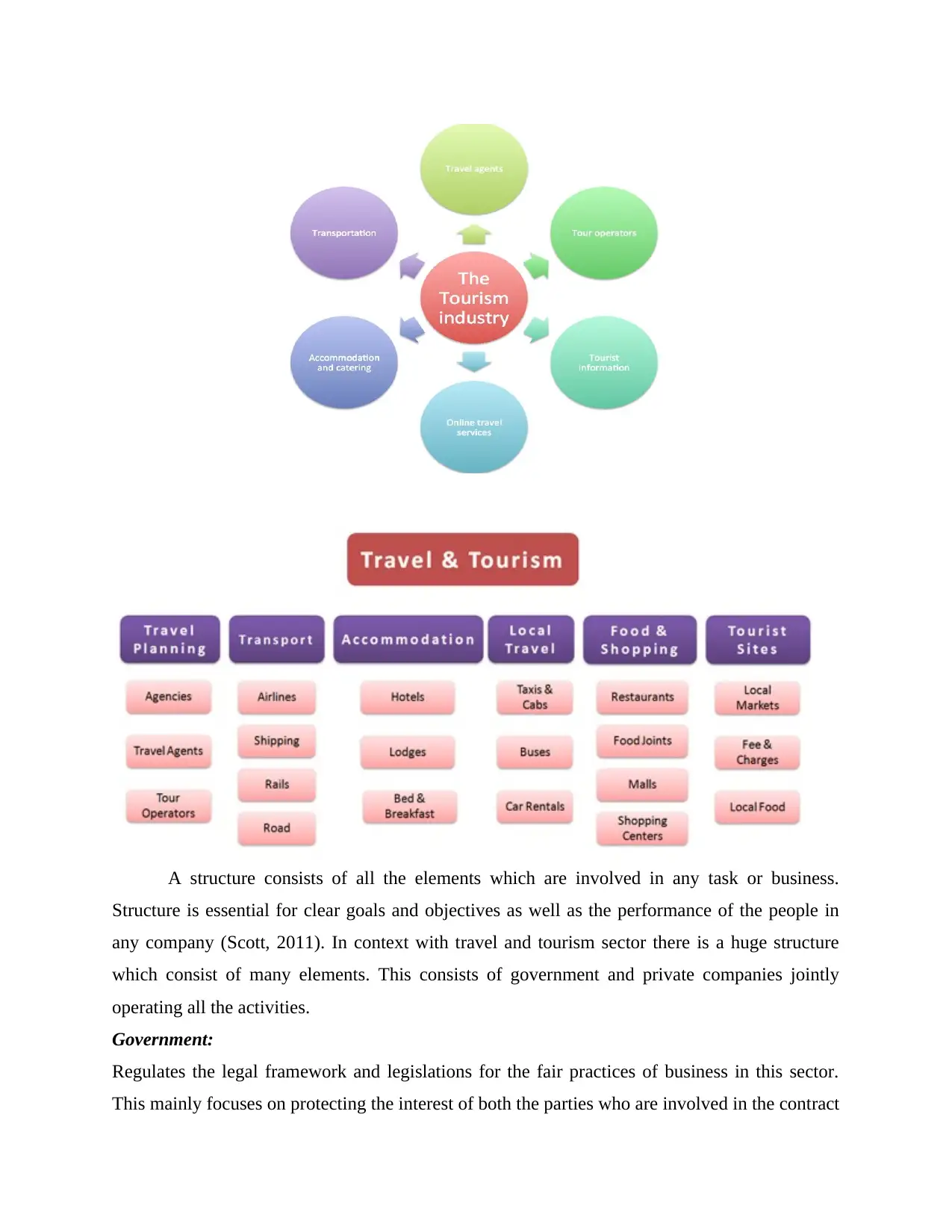
A structure consists of all the elements which are involved in any task or business.
Structure is essential for clear goals and objectives as well as the performance of the people in
any company (Scott, 2011). In context with travel and tourism sector there is a huge structure
which consist of many elements. This consists of government and private companies jointly
operating all the activities.
Government:
Regulates the legal framework and legislations for the fair practices of business in this sector.
This mainly focuses on protecting the interest of both the parties who are involved in the contract
Structure is essential for clear goals and objectives as well as the performance of the people in
any company (Scott, 2011). In context with travel and tourism sector there is a huge structure
which consist of many elements. This consists of government and private companies jointly
operating all the activities.
Government:
Regulates the legal framework and legislations for the fair practices of business in this sector.
This mainly focuses on protecting the interest of both the parties who are involved in the contract
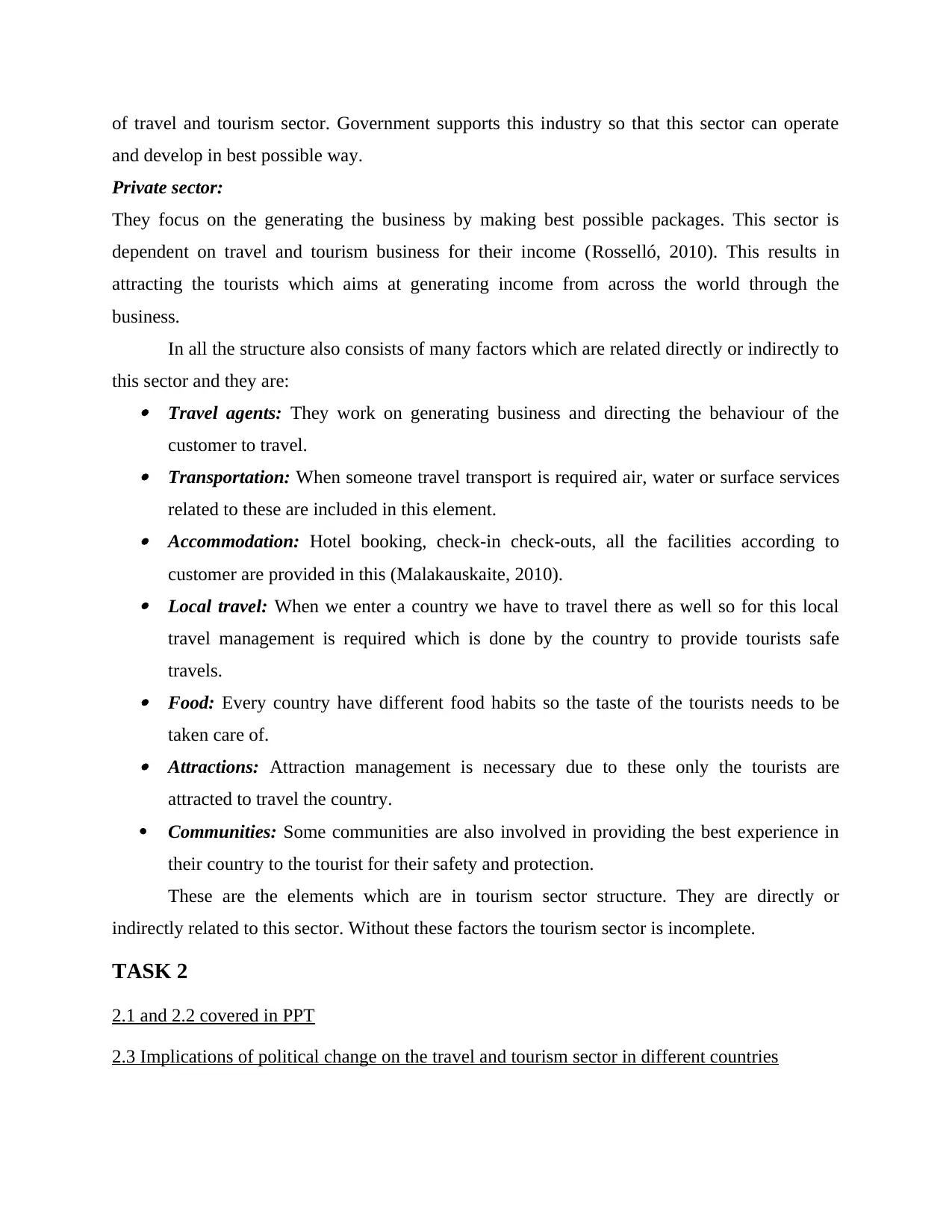
of travel and tourism sector. Government supports this industry so that this sector can operate
and develop in best possible way.
Private sector:
They focus on the generating the business by making best possible packages. This sector is
dependent on travel and tourism business for their income (Rosselló, 2010). This results in
attracting the tourists which aims at generating income from across the world through the
business.
In all the structure also consists of many factors which are related directly or indirectly to
this sector and they are: Travel agents: They work on generating business and directing the behaviour of the
customer to travel. Transportation: When someone travel transport is required air, water or surface services
related to these are included in this element. Accommodation: Hotel booking, check-in check-outs, all the facilities according to
customer are provided in this (Malakauskaite, 2010). Local travel: When we enter a country we have to travel there as well so for this local
travel management is required which is done by the country to provide tourists safe
travels. Food: Every country have different food habits so the taste of the tourists needs to be
taken care of. Attractions: Attraction management is necessary due to these only the tourists are
attracted to travel the country.
Communities: Some communities are also involved in providing the best experience in
their country to the tourist for their safety and protection.
These are the elements which are in tourism sector structure. They are directly or
indirectly related to this sector. Without these factors the tourism sector is incomplete.
TASK 2
2.1 and 2.2 covered in PPT
2.3 Implications of political change on the travel and tourism sector in different countries
and develop in best possible way.
Private sector:
They focus on the generating the business by making best possible packages. This sector is
dependent on travel and tourism business for their income (Rosselló, 2010). This results in
attracting the tourists which aims at generating income from across the world through the
business.
In all the structure also consists of many factors which are related directly or indirectly to
this sector and they are: Travel agents: They work on generating business and directing the behaviour of the
customer to travel. Transportation: When someone travel transport is required air, water or surface services
related to these are included in this element. Accommodation: Hotel booking, check-in check-outs, all the facilities according to
customer are provided in this (Malakauskaite, 2010). Local travel: When we enter a country we have to travel there as well so for this local
travel management is required which is done by the country to provide tourists safe
travels. Food: Every country have different food habits so the taste of the tourists needs to be
taken care of. Attractions: Attraction management is necessary due to these only the tourists are
attracted to travel the country.
Communities: Some communities are also involved in providing the best experience in
their country to the tourist for their safety and protection.
These are the elements which are in tourism sector structure. They are directly or
indirectly related to this sector. Without these factors the tourism sector is incomplete.
TASK 2
2.1 and 2.2 covered in PPT
2.3 Implications of political change on the travel and tourism sector in different countries
⊘ This is a preview!⊘
Do you want full access?
Subscribe today to unlock all pages.

Trusted by 1+ million students worldwide
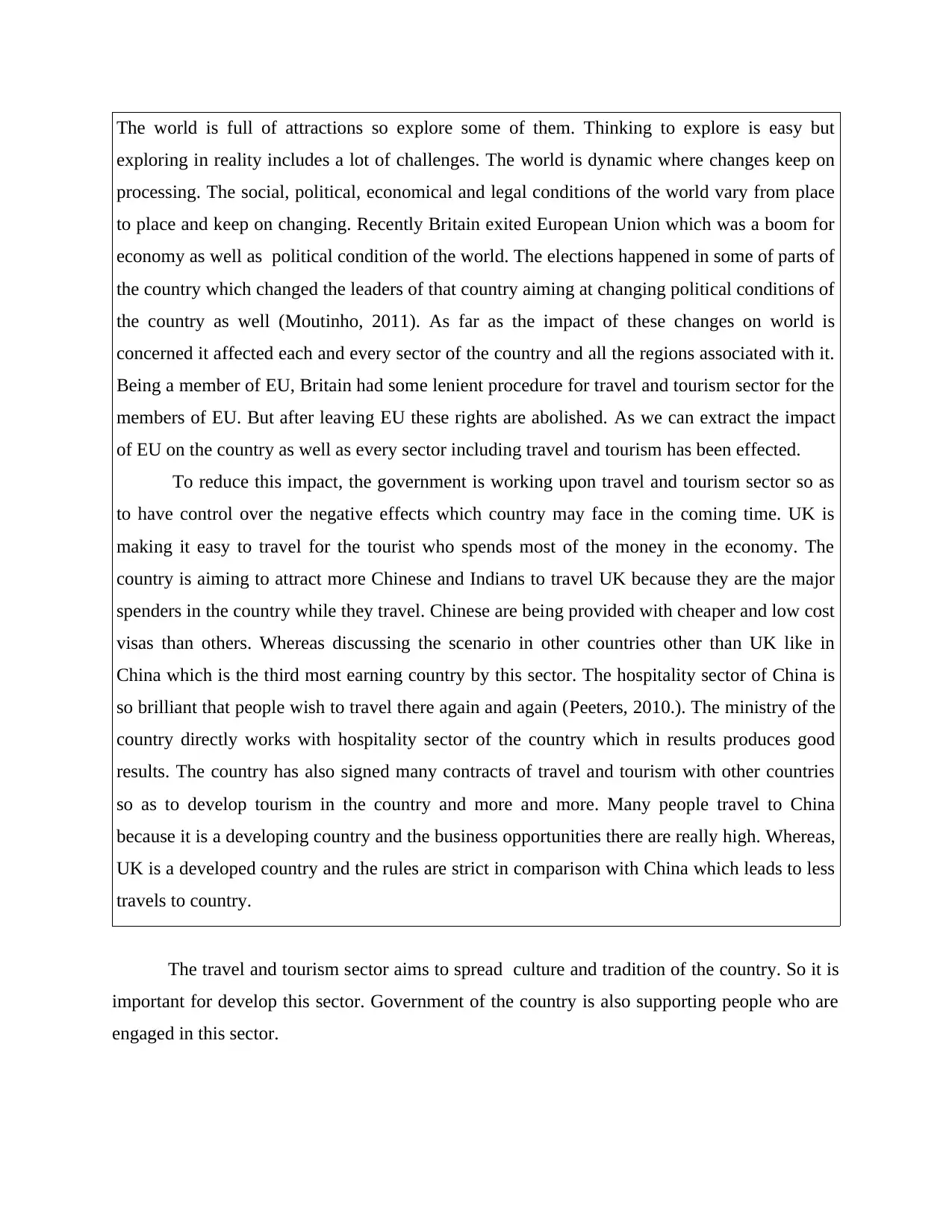
The world is full of attractions so explore some of them. Thinking to explore is easy but
exploring in reality includes a lot of challenges. The world is dynamic where changes keep on
processing. The social, political, economical and legal conditions of the world vary from place
to place and keep on changing. Recently Britain exited European Union which was a boom for
economy as well as political condition of the world. The elections happened in some of parts of
the country which changed the leaders of that country aiming at changing political conditions of
the country as well (Moutinho, 2011). As far as the impact of these changes on world is
concerned it affected each and every sector of the country and all the regions associated with it.
Being a member of EU, Britain had some lenient procedure for travel and tourism sector for the
members of EU. But after leaving EU these rights are abolished. As we can extract the impact
of EU on the country as well as every sector including travel and tourism has been effected.
To reduce this impact, the government is working upon travel and tourism sector so as
to have control over the negative effects which country may face in the coming time. UK is
making it easy to travel for the tourist who spends most of the money in the economy. The
country is aiming to attract more Chinese and Indians to travel UK because they are the major
spenders in the country while they travel. Chinese are being provided with cheaper and low cost
visas than others. Whereas discussing the scenario in other countries other than UK like in
China which is the third most earning country by this sector. The hospitality sector of China is
so brilliant that people wish to travel there again and again (Peeters, 2010.). The ministry of the
country directly works with hospitality sector of the country which in results produces good
results. The country has also signed many contracts of travel and tourism with other countries
so as to develop tourism in the country and more and more. Many people travel to China
because it is a developing country and the business opportunities there are really high. Whereas,
UK is a developed country and the rules are strict in comparison with China which leads to less
travels to country.
The travel and tourism sector aims to spread culture and tradition of the country. So it is
important for develop this sector. Government of the country is also supporting people who are
engaged in this sector.
exploring in reality includes a lot of challenges. The world is dynamic where changes keep on
processing. The social, political, economical and legal conditions of the world vary from place
to place and keep on changing. Recently Britain exited European Union which was a boom for
economy as well as political condition of the world. The elections happened in some of parts of
the country which changed the leaders of that country aiming at changing political conditions of
the country as well (Moutinho, 2011). As far as the impact of these changes on world is
concerned it affected each and every sector of the country and all the regions associated with it.
Being a member of EU, Britain had some lenient procedure for travel and tourism sector for the
members of EU. But after leaving EU these rights are abolished. As we can extract the impact
of EU on the country as well as every sector including travel and tourism has been effected.
To reduce this impact, the government is working upon travel and tourism sector so as
to have control over the negative effects which country may face in the coming time. UK is
making it easy to travel for the tourist who spends most of the money in the economy. The
country is aiming to attract more Chinese and Indians to travel UK because they are the major
spenders in the country while they travel. Chinese are being provided with cheaper and low cost
visas than others. Whereas discussing the scenario in other countries other than UK like in
China which is the third most earning country by this sector. The hospitality sector of China is
so brilliant that people wish to travel there again and again (Peeters, 2010.). The ministry of the
country directly works with hospitality sector of the country which in results produces good
results. The country has also signed many contracts of travel and tourism with other countries
so as to develop tourism in the country and more and more. Many people travel to China
because it is a developing country and the business opportunities there are really high. Whereas,
UK is a developed country and the rules are strict in comparison with China which leads to less
travels to country.
The travel and tourism sector aims to spread culture and tradition of the country. So it is
important for develop this sector. Government of the country is also supporting people who are
engaged in this sector.
Paraphrase This Document
Need a fresh take? Get an instant paraphrase of this document with our AI Paraphraser
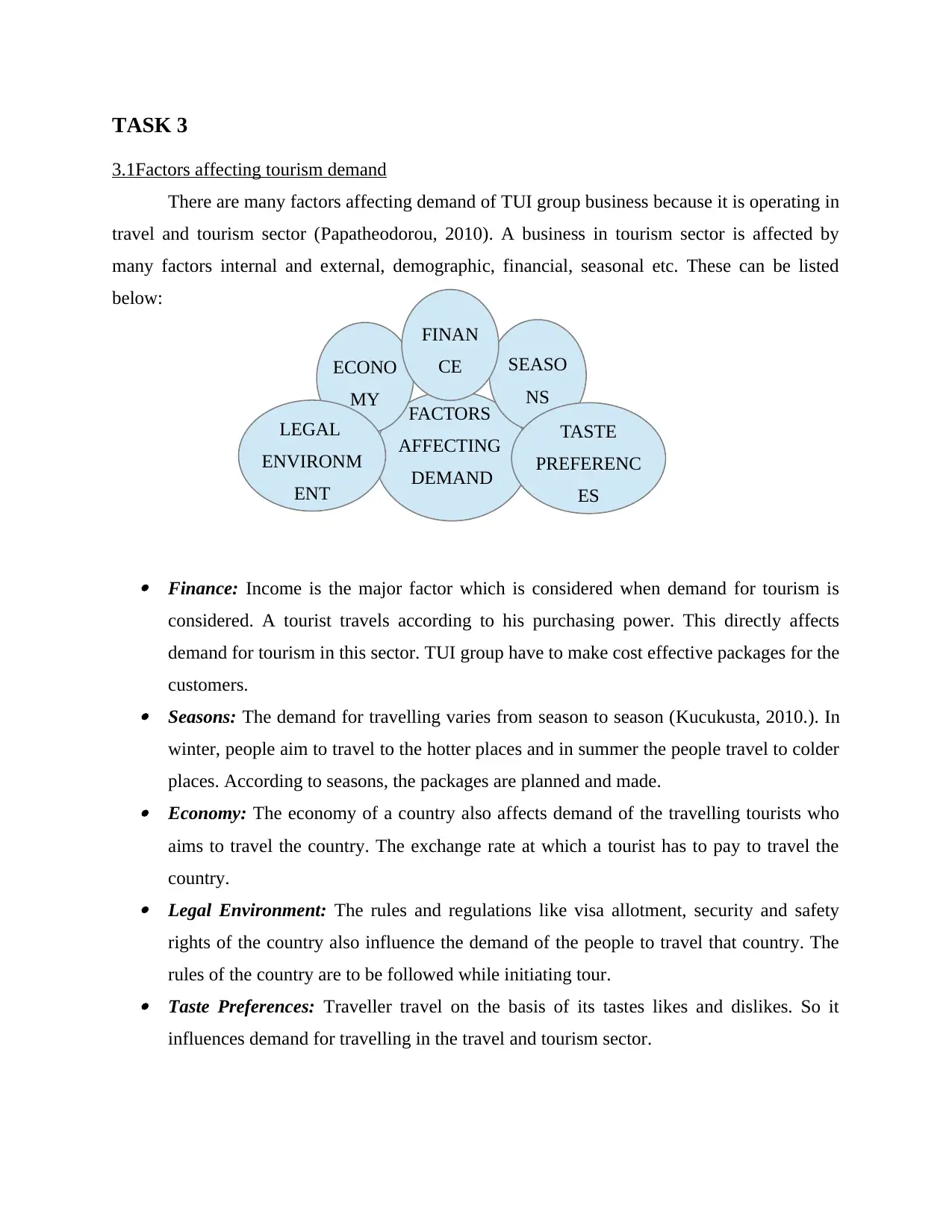
TASK 3
3.1Factors affecting tourism demand
There are many factors affecting demand of TUI group business because it is operating in
travel and tourism sector (Papatheodorou, 2010). A business in tourism sector is affected by
many factors internal and external, demographic, financial, seasonal etc. These can be listed
below:
Finance: Income is the major factor which is considered when demand for tourism is
considered. A tourist travels according to his purchasing power. This directly affects
demand for tourism in this sector. TUI group have to make cost effective packages for the
customers. Seasons: The demand for travelling varies from season to season (Kucukusta, 2010.). In
winter, people aim to travel to the hotter places and in summer the people travel to colder
places. According to seasons, the packages are planned and made. Economy: The economy of a country also affects demand of the travelling tourists who
aims to travel the country. The exchange rate at which a tourist has to pay to travel the
country. Legal Environment: The rules and regulations like visa allotment, security and safety
rights of the country also influence the demand of the people to travel that country. The
rules of the country are to be followed while initiating tour. Taste Preferences: Traveller travel on the basis of its tastes likes and dislikes. So it
influences demand for travelling in the travel and tourism sector.
FACTORS
AFFECTING
DEMAND
ECONO
MY
SEASO
NS
TASTE
PREFERENC
ES
LEGAL
ENVIRONM
ENT
FINAN
CE
3.1Factors affecting tourism demand
There are many factors affecting demand of TUI group business because it is operating in
travel and tourism sector (Papatheodorou, 2010). A business in tourism sector is affected by
many factors internal and external, demographic, financial, seasonal etc. These can be listed
below:
Finance: Income is the major factor which is considered when demand for tourism is
considered. A tourist travels according to his purchasing power. This directly affects
demand for tourism in this sector. TUI group have to make cost effective packages for the
customers. Seasons: The demand for travelling varies from season to season (Kucukusta, 2010.). In
winter, people aim to travel to the hotter places and in summer the people travel to colder
places. According to seasons, the packages are planned and made. Economy: The economy of a country also affects demand of the travelling tourists who
aims to travel the country. The exchange rate at which a tourist has to pay to travel the
country. Legal Environment: The rules and regulations like visa allotment, security and safety
rights of the country also influence the demand of the people to travel that country. The
rules of the country are to be followed while initiating tour. Taste Preferences: Traveller travel on the basis of its tastes likes and dislikes. So it
influences demand for travelling in the travel and tourism sector.
FACTORS
AFFECTING
DEMAND
ECONO
MY
SEASO
NS
TASTE
PREFERENC
ES
LEGAL
ENVIRONM
ENT
FINAN
CE
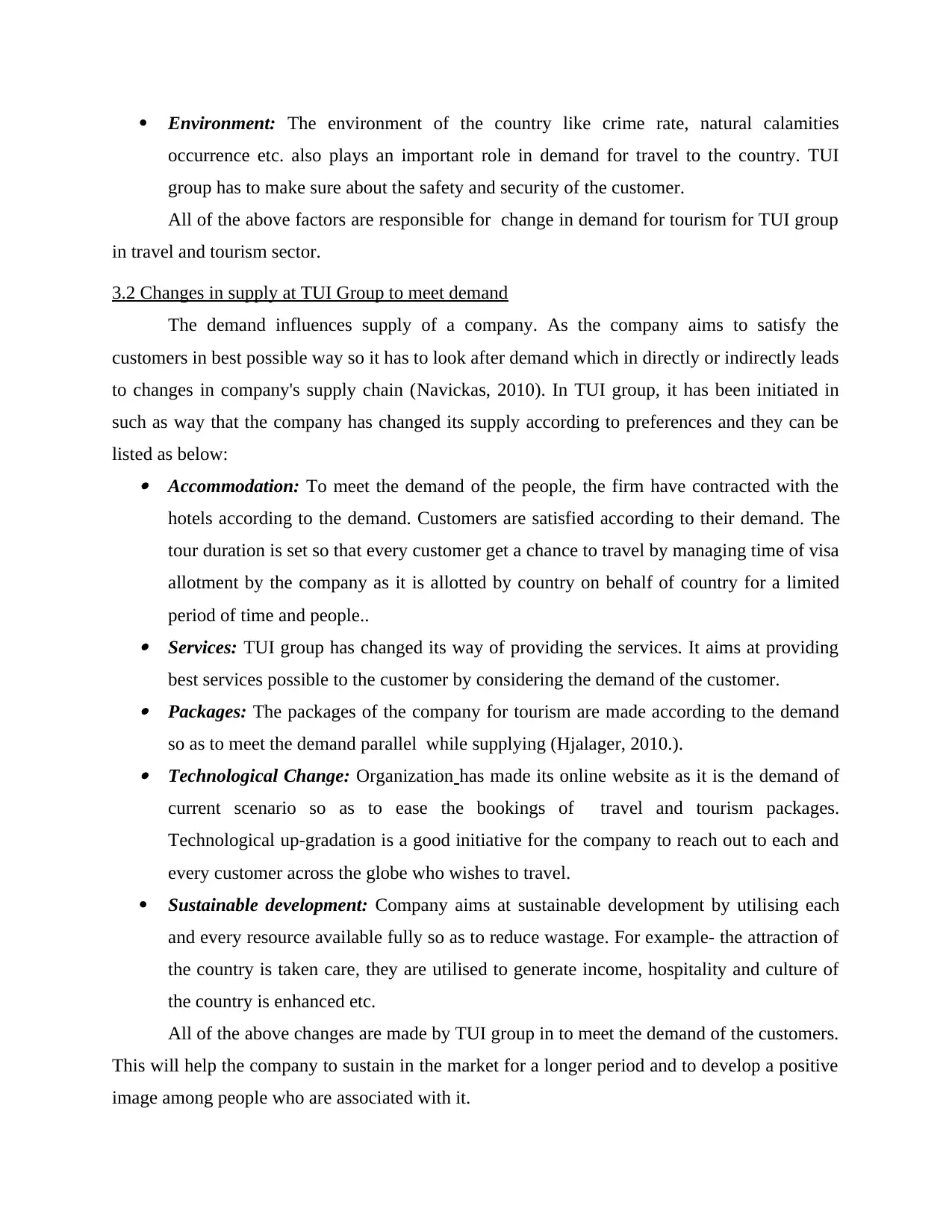
Environment: The environment of the country like crime rate, natural calamities
occurrence etc. also plays an important role in demand for travel to the country. TUI
group has to make sure about the safety and security of the customer.
All of the above factors are responsible for change in demand for tourism for TUI group
in travel and tourism sector.
3.2 Changes in supply at TUI Group to meet demand
The demand influences supply of a company. As the company aims to satisfy the
customers in best possible way so it has to look after demand which in directly or indirectly leads
to changes in company's supply chain (Navickas, 2010). In TUI group, it has been initiated in
such as way that the company has changed its supply according to preferences and they can be
listed as below: Accommodation: To meet the demand of the people, the firm have contracted with the
hotels according to the demand. Customers are satisfied according to their demand. The
tour duration is set so that every customer get a chance to travel by managing time of visa
allotment by the company as it is allotted by country on behalf of country for a limited
period of time and people.. Services: TUI group has changed its way of providing the services. It aims at providing
best services possible to the customer by considering the demand of the customer. Packages: The packages of the company for tourism are made according to the demand
so as to meet the demand parallel while supplying (Hjalager, 2010.). Technological Change: Organization has made its online website as it is the demand of
current scenario so as to ease the bookings of travel and tourism packages.
Technological up-gradation is a good initiative for the company to reach out to each and
every customer across the globe who wishes to travel.
Sustainable development: Company aims at sustainable development by utilising each
and every resource available fully so as to reduce wastage. For example- the attraction of
the country is taken care, they are utilised to generate income, hospitality and culture of
the country is enhanced etc.
All of the above changes are made by TUI group in to meet the demand of the customers.
This will help the company to sustain in the market for a longer period and to develop a positive
image among people who are associated with it.
occurrence etc. also plays an important role in demand for travel to the country. TUI
group has to make sure about the safety and security of the customer.
All of the above factors are responsible for change in demand for tourism for TUI group
in travel and tourism sector.
3.2 Changes in supply at TUI Group to meet demand
The demand influences supply of a company. As the company aims to satisfy the
customers in best possible way so it has to look after demand which in directly or indirectly leads
to changes in company's supply chain (Navickas, 2010). In TUI group, it has been initiated in
such as way that the company has changed its supply according to preferences and they can be
listed as below: Accommodation: To meet the demand of the people, the firm have contracted with the
hotels according to the demand. Customers are satisfied according to their demand. The
tour duration is set so that every customer get a chance to travel by managing time of visa
allotment by the company as it is allotted by country on behalf of country for a limited
period of time and people.. Services: TUI group has changed its way of providing the services. It aims at providing
best services possible to the customer by considering the demand of the customer. Packages: The packages of the company for tourism are made according to the demand
so as to meet the demand parallel while supplying (Hjalager, 2010.). Technological Change: Organization has made its online website as it is the demand of
current scenario so as to ease the bookings of travel and tourism packages.
Technological up-gradation is a good initiative for the company to reach out to each and
every customer across the globe who wishes to travel.
Sustainable development: Company aims at sustainable development by utilising each
and every resource available fully so as to reduce wastage. For example- the attraction of
the country is taken care, they are utilised to generate income, hospitality and culture of
the country is enhanced etc.
All of the above changes are made by TUI group in to meet the demand of the customers.
This will help the company to sustain in the market for a longer period and to develop a positive
image among people who are associated with it.
⊘ This is a preview!⊘
Do you want full access?
Subscribe today to unlock all pages.

Trusted by 1+ million students worldwide
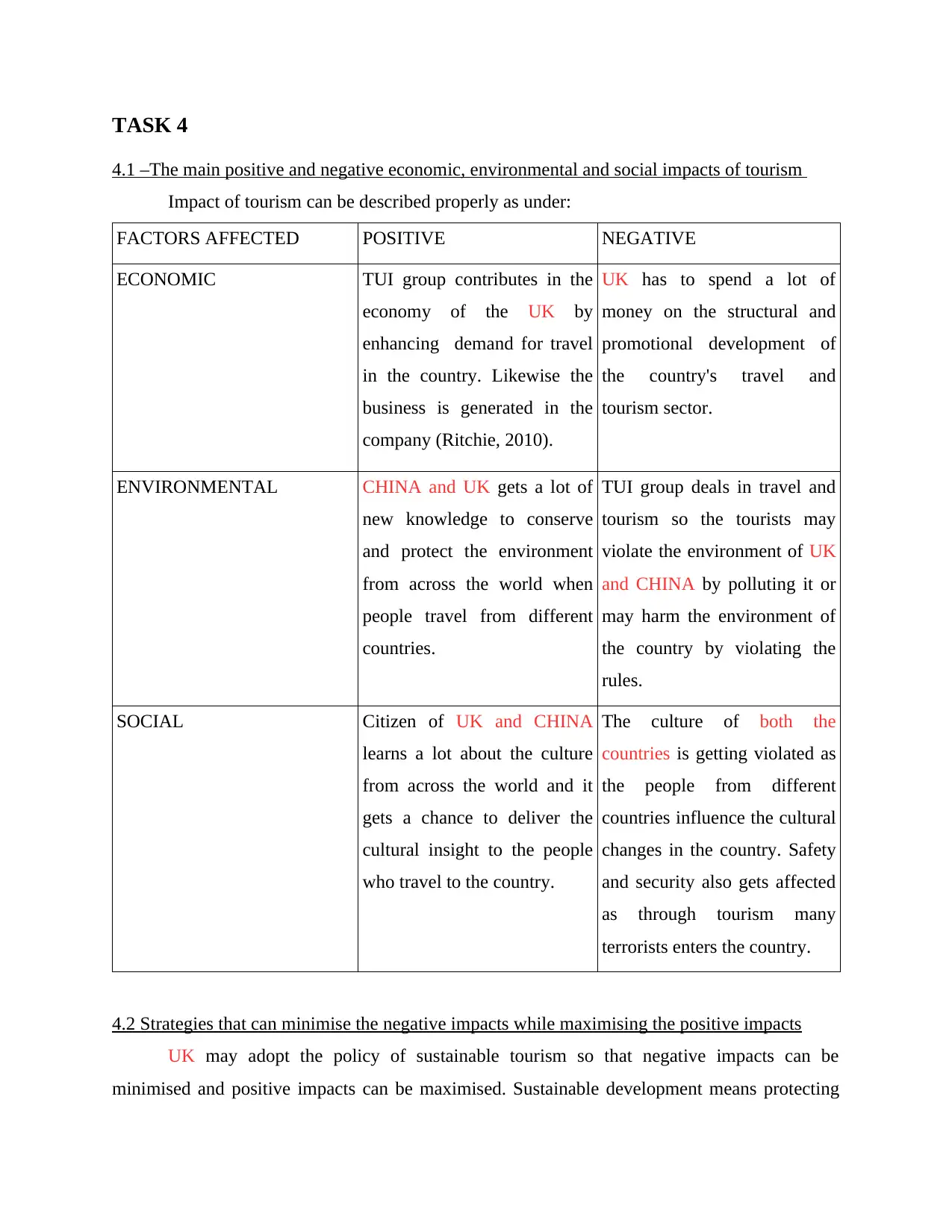
TASK 4
4.1 –The main positive and negative economic, environmental and social impacts of tourism
Impact of tourism can be described properly as under:
FACTORS AFFECTED POSITIVE NEGATIVE
ECONOMIC TUI group contributes in the
economy of the UK by
enhancing demand for travel
in the country. Likewise the
business is generated in the
company (Ritchie, 2010).
UK has to spend a lot of
money on the structural and
promotional development of
the country's travel and
tourism sector.
ENVIRONMENTAL CHINA and UK gets a lot of
new knowledge to conserve
and protect the environment
from across the world when
people travel from different
countries.
TUI group deals in travel and
tourism so the tourists may
violate the environment of UK
and CHINA by polluting it or
may harm the environment of
the country by violating the
rules.
SOCIAL Citizen of UK and CHINA
learns a lot about the culture
from across the world and it
gets a chance to deliver the
cultural insight to the people
who travel to the country.
The culture of both the
countries is getting violated as
the people from different
countries influence the cultural
changes in the country. Safety
and security also gets affected
as through tourism many
terrorists enters the country.
4.2 Strategies that can minimise the negative impacts while maximising the positive impacts
UK may adopt the policy of sustainable tourism so that negative impacts can be
minimised and positive impacts can be maximised. Sustainable development means protecting
4.1 –The main positive and negative economic, environmental and social impacts of tourism
Impact of tourism can be described properly as under:
FACTORS AFFECTED POSITIVE NEGATIVE
ECONOMIC TUI group contributes in the
economy of the UK by
enhancing demand for travel
in the country. Likewise the
business is generated in the
company (Ritchie, 2010).
UK has to spend a lot of
money on the structural and
promotional development of
the country's travel and
tourism sector.
ENVIRONMENTAL CHINA and UK gets a lot of
new knowledge to conserve
and protect the environment
from across the world when
people travel from different
countries.
TUI group deals in travel and
tourism so the tourists may
violate the environment of UK
and CHINA by polluting it or
may harm the environment of
the country by violating the
rules.
SOCIAL Citizen of UK and CHINA
learns a lot about the culture
from across the world and it
gets a chance to deliver the
cultural insight to the people
who travel to the country.
The culture of both the
countries is getting violated as
the people from different
countries influence the cultural
changes in the country. Safety
and security also gets affected
as through tourism many
terrorists enters the country.
4.2 Strategies that can minimise the negative impacts while maximising the positive impacts
UK may adopt the policy of sustainable tourism so that negative impacts can be
minimised and positive impacts can be maximised. Sustainable development means protecting
Paraphrase This Document
Need a fresh take? Get an instant paraphrase of this document with our AI Paraphraser
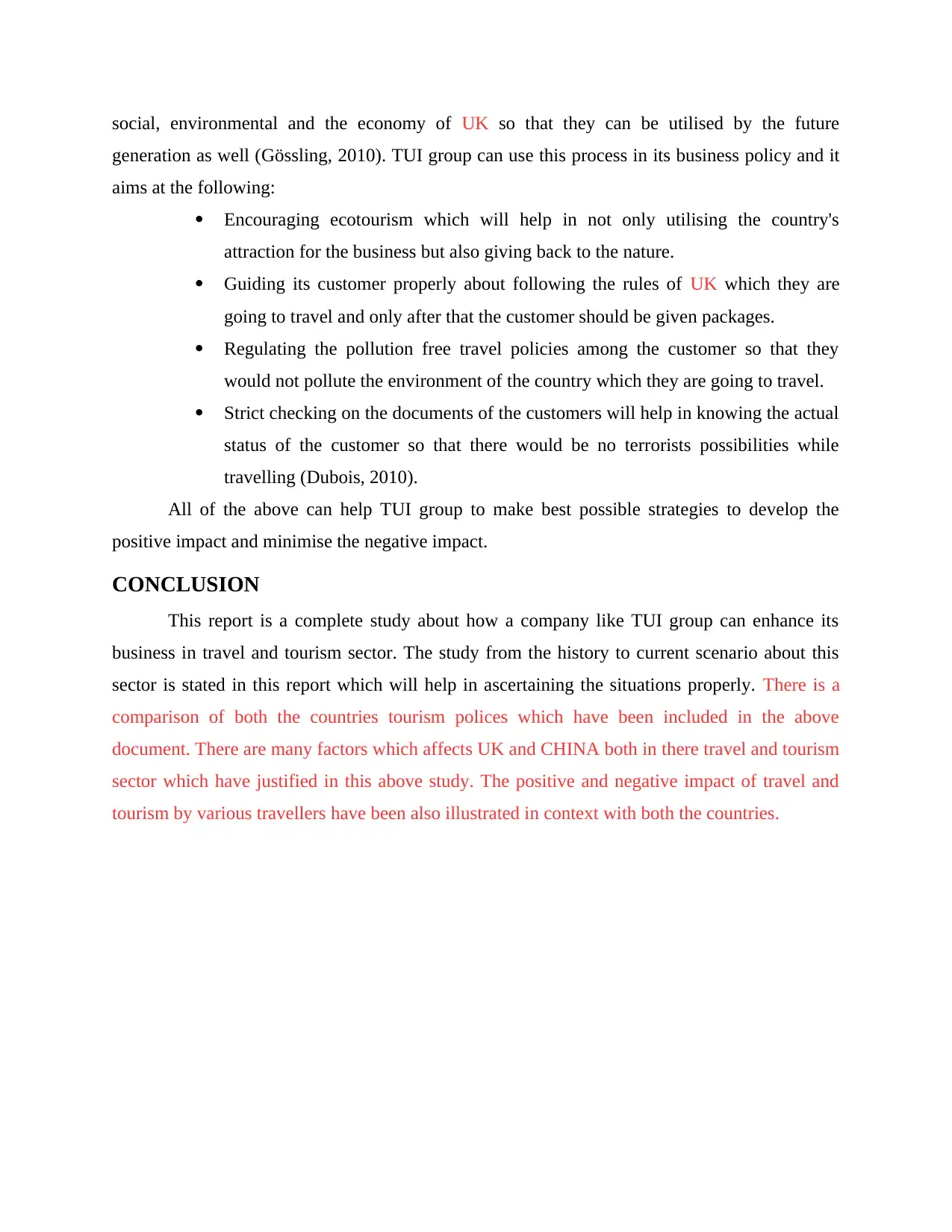
social, environmental and the economy of UK so that they can be utilised by the future
generation as well (Gössling, 2010). TUI group can use this process in its business policy and it
aims at the following:
Encouraging ecotourism which will help in not only utilising the country's
attraction for the business but also giving back to the nature.
Guiding its customer properly about following the rules of UK which they are
going to travel and only after that the customer should be given packages.
Regulating the pollution free travel policies among the customer so that they
would not pollute the environment of the country which they are going to travel.
Strict checking on the documents of the customers will help in knowing the actual
status of the customer so that there would be no terrorists possibilities while
travelling (Dubois, 2010).
All of the above can help TUI group to make best possible strategies to develop the
positive impact and minimise the negative impact.
CONCLUSION
This report is a complete study about how a company like TUI group can enhance its
business in travel and tourism sector. The study from the history to current scenario about this
sector is stated in this report which will help in ascertaining the situations properly. There is a
comparison of both the countries tourism polices which have been included in the above
document. There are many factors which affects UK and CHINA both in there travel and tourism
sector which have justified in this above study. The positive and negative impact of travel and
tourism by various travellers have been also illustrated in context with both the countries.
generation as well (Gössling, 2010). TUI group can use this process in its business policy and it
aims at the following:
Encouraging ecotourism which will help in not only utilising the country's
attraction for the business but also giving back to the nature.
Guiding its customer properly about following the rules of UK which they are
going to travel and only after that the customer should be given packages.
Regulating the pollution free travel policies among the customer so that they
would not pollute the environment of the country which they are going to travel.
Strict checking on the documents of the customers will help in knowing the actual
status of the customer so that there would be no terrorists possibilities while
travelling (Dubois, 2010).
All of the above can help TUI group to make best possible strategies to develop the
positive impact and minimise the negative impact.
CONCLUSION
This report is a complete study about how a company like TUI group can enhance its
business in travel and tourism sector. The study from the history to current scenario about this
sector is stated in this report which will help in ascertaining the situations properly. There is a
comparison of both the countries tourism polices which have been included in the above
document. There are many factors which affects UK and CHINA both in there travel and tourism
sector which have justified in this above study. The positive and negative impact of travel and
tourism by various travellers have been also illustrated in context with both the countries.
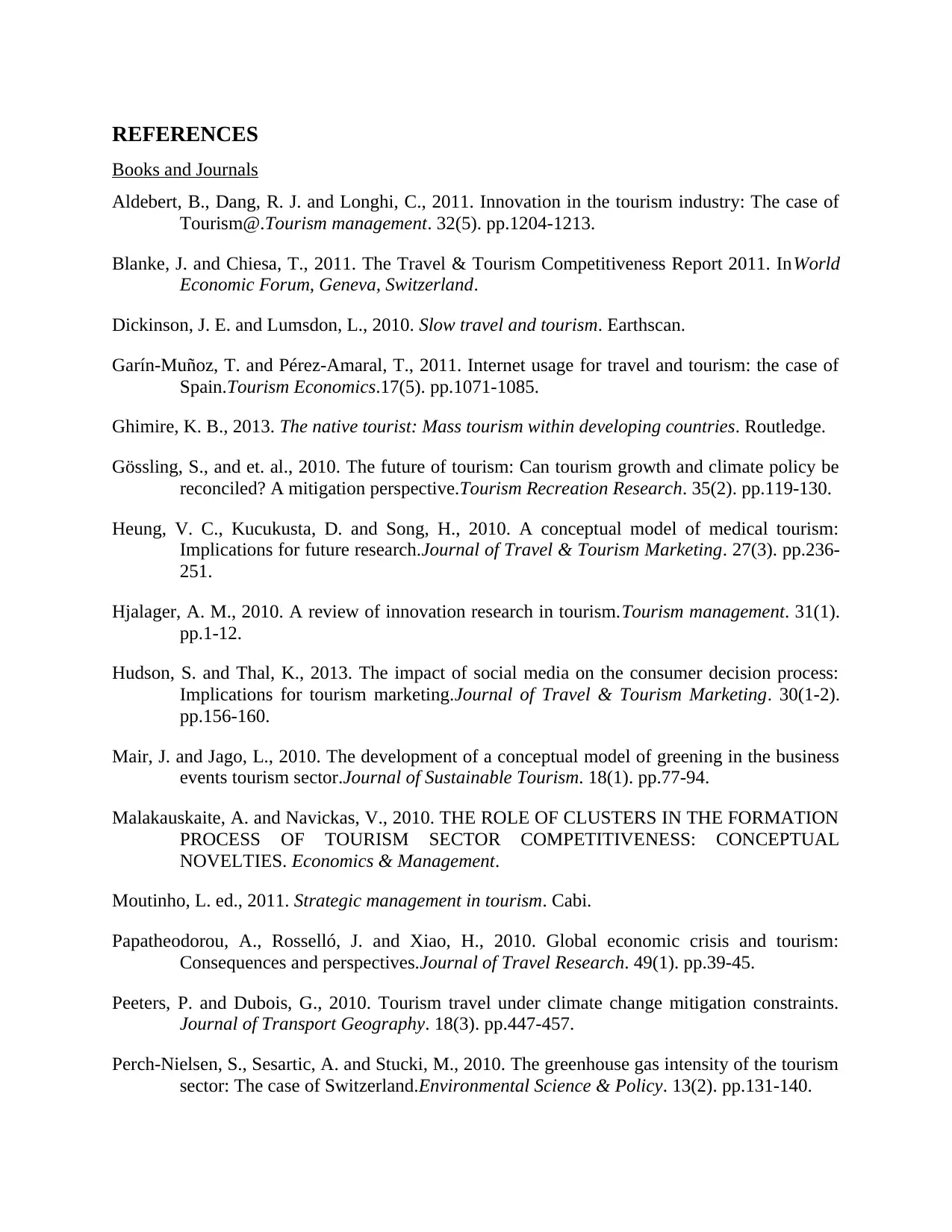
REFERENCES
Books and Journals
Aldebert, B., Dang, R. J. and Longhi, C., 2011. Innovation in the tourism industry: The case of
Tourism@.Tourism management. 32(5). pp.1204-1213.
Blanke, J. and Chiesa, T., 2011. The Travel & Tourism Competitiveness Report 2011. InWorld
Economic Forum, Geneva, Switzerland.
Dickinson, J. E. and Lumsdon, L., 2010. Slow travel and tourism. Earthscan.
Garín-Muñoz, T. and Pérez-Amaral, T., 2011. Internet usage for travel and tourism: the case of
Spain.Tourism Economics.17(5). pp.1071-1085.
Ghimire, K. B., 2013. The native tourist: Mass tourism within developing countries. Routledge.
Gössling, S., and et. al., 2010. The future of tourism: Can tourism growth and climate policy be
reconciled? A mitigation perspective.Tourism Recreation Research. 35(2). pp.119-130.
Heung, V. C., Kucukusta, D. and Song, H., 2010. A conceptual model of medical tourism:
Implications for future research.Journal of Travel & Tourism Marketing. 27(3). pp.236-
251.
Hjalager, A. M., 2010. A review of innovation research in tourism.Tourism management. 31(1).
pp.1-12.
Hudson, S. and Thal, K., 2013. The impact of social media on the consumer decision process:
Implications for tourism marketing.Journal of Travel & Tourism Marketing. 30(1-2).
pp.156-160.
Mair, J. and Jago, L., 2010. The development of a conceptual model of greening in the business
events tourism sector.Journal of Sustainable Tourism. 18(1). pp.77-94.
Malakauskaite, A. and Navickas, V., 2010. THE ROLE OF CLUSTERS IN THE FORMATION
PROCESS OF TOURISM SECTOR COMPETITIVENESS: CONCEPTUAL
NOVELTIES. Economics & Management.
Moutinho, L. ed., 2011. Strategic management in tourism. Cabi.
Papatheodorou, A., Rosselló, J. and Xiao, H., 2010. Global economic crisis and tourism:
Consequences and perspectives.Journal of Travel Research. 49(1). pp.39-45.
Peeters, P. and Dubois, G., 2010. Tourism travel under climate change mitigation constraints.
Journal of Transport Geography. 18(3). pp.447-457.
Perch-Nielsen, S., Sesartic, A. and Stucki, M., 2010. The greenhouse gas intensity of the tourism
sector: The case of Switzerland.Environmental Science & Policy. 13(2). pp.131-140.
Books and Journals
Aldebert, B., Dang, R. J. and Longhi, C., 2011. Innovation in the tourism industry: The case of
Tourism@.Tourism management. 32(5). pp.1204-1213.
Blanke, J. and Chiesa, T., 2011. The Travel & Tourism Competitiveness Report 2011. InWorld
Economic Forum, Geneva, Switzerland.
Dickinson, J. E. and Lumsdon, L., 2010. Slow travel and tourism. Earthscan.
Garín-Muñoz, T. and Pérez-Amaral, T., 2011. Internet usage for travel and tourism: the case of
Spain.Tourism Economics.17(5). pp.1071-1085.
Ghimire, K. B., 2013. The native tourist: Mass tourism within developing countries. Routledge.
Gössling, S., and et. al., 2010. The future of tourism: Can tourism growth and climate policy be
reconciled? A mitigation perspective.Tourism Recreation Research. 35(2). pp.119-130.
Heung, V. C., Kucukusta, D. and Song, H., 2010. A conceptual model of medical tourism:
Implications for future research.Journal of Travel & Tourism Marketing. 27(3). pp.236-
251.
Hjalager, A. M., 2010. A review of innovation research in tourism.Tourism management. 31(1).
pp.1-12.
Hudson, S. and Thal, K., 2013. The impact of social media on the consumer decision process:
Implications for tourism marketing.Journal of Travel & Tourism Marketing. 30(1-2).
pp.156-160.
Mair, J. and Jago, L., 2010. The development of a conceptual model of greening in the business
events tourism sector.Journal of Sustainable Tourism. 18(1). pp.77-94.
Malakauskaite, A. and Navickas, V., 2010. THE ROLE OF CLUSTERS IN THE FORMATION
PROCESS OF TOURISM SECTOR COMPETITIVENESS: CONCEPTUAL
NOVELTIES. Economics & Management.
Moutinho, L. ed., 2011. Strategic management in tourism. Cabi.
Papatheodorou, A., Rosselló, J. and Xiao, H., 2010. Global economic crisis and tourism:
Consequences and perspectives.Journal of Travel Research. 49(1). pp.39-45.
Peeters, P. and Dubois, G., 2010. Tourism travel under climate change mitigation constraints.
Journal of Transport Geography. 18(3). pp.447-457.
Perch-Nielsen, S., Sesartic, A. and Stucki, M., 2010. The greenhouse gas intensity of the tourism
sector: The case of Switzerland.Environmental Science & Policy. 13(2). pp.131-140.
⊘ This is a preview!⊘
Do you want full access?
Subscribe today to unlock all pages.

Trusted by 1+ million students worldwide
1 out of 13
Related Documents
Your All-in-One AI-Powered Toolkit for Academic Success.
+13062052269
info@desklib.com
Available 24*7 on WhatsApp / Email
![[object Object]](/_next/static/media/star-bottom.7253800d.svg)
Unlock your academic potential
Copyright © 2020–2026 A2Z Services. All Rights Reserved. Developed and managed by ZUCOL.





